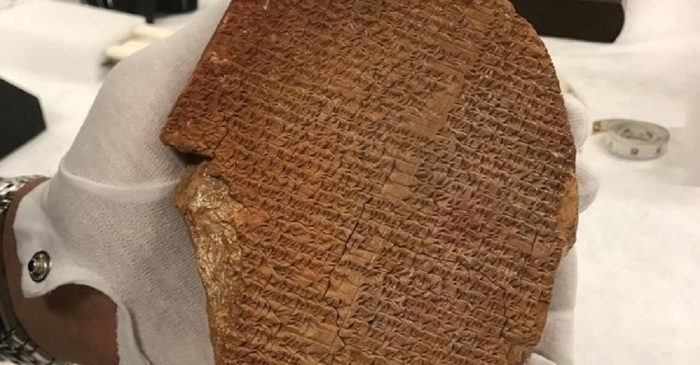Federal court orders forfeiture of ancient Gilgamesh artifact from Museum of the Bible

A federal court has ordered that a small ancient fragment depicting a portion of the Epic of Gilgamesh be forfeited by the Museum of the Bible two years after federal agents confiscated the artifact.
The U.S. District Court for the Eastern District of New York ordered the forfeiture of the Gilgamesh Dream Tablet, which was purchased by Hobby Lobby Stores, Inc. in 2014 to be displayed at the Museum of the Bible.
Assistant Attorney General Kenneth A. Polite Jr. of the Justice Department’s Criminal Division explained in a statement the significance of the forfeiture.
“Forfeiture of the Gilgamesh Dream Tablet demonstrates the Department’s continued commitment to eliminating smuggled cultural property from the U.S. art market,” said Polite.
“Thwarting trade in smuggled goods by seizing and forfeiting an ancient artifact shows the department’s dedication to using all available tools, including forfeiture, to ensure justice.”
The Gilgamesh fragment was obtained from Iraq in 2003 when large numbers of ancient artifacts were stolen or went missing after the toppling of the Saddam Hussein regime by a United States-led international coalition invasion.
The artifact was given a false provenance and sold multiple times before being purchased by Hobby Lobby and several other historical items from an auction house in 2014.
Hobby Lobby filed a lawsuit against the reputable Christie’s auction house for fraud and breach of warranty for selling the Gilgamesh tablet that authorities say had been looted.
Last year, it was reported that Hobby Lobby President Steve Green was in the process of repatriating 11,500 antiquities to the Iraqi and Egyptian governments.
Jeffrey Kloha, the Chief Curatorial Officer for the Museum of the Bible, stressed that the artifacts were acquired between 2009 and 2014, most of which were acquired prior to 2011. The museum officially opened in 2017.
"The Museum has taken extraordinary steps since to resolve the issues associated with them. We approached both Iraq and Egypt ourselves in 2017 and early 2018 to inform them of our intention to research and return these objects," Kloha said in a statement shared with The Christian Post. "All of this was done amicably and directly with the countries of origin along with the awareness of the United States government. It is unfortunate that much of the reporting on this subject does not make it clear that this is the completion of a long process and not a new story."
Kloha added that last May, the museum announced its full support of the Department of Homeland Security’s efforts to return the Gilgamesh fragment to Iraq.
In 2019, authorities seized the Gilgamesh Dream Tablet from the Museum of the Bible. In 2020, a civil complaint was filed requesting forfeiture of the artifact.
“We are proud of our investigation that led to this reclaiming of a piece of Iraq’s cultural history,” said Peter Fitzhugh of Home Securities Investigations of New York in a statement last year.
“This rare tablet was pillaged from Iraq and years later sold at a major auction house, with a questionable and unsupported provenance.”
Hobby Lobby has cooperated with the investigation. CEO and the museum's chair Steve Green acknowledged that he had made many mistakes when attempting to collect historical items for his Museum.
“In 2009, when I began acquiring biblical manuscripts and artifacts for what would ultimately form the collection at Museum of the Bible, I knew little about the world of collecting,” said Green in a statement last year.
“It is well known that I trusted the wrong people to guide me, and unwittingly dealt with unscrupulous dealers in those early years. One area where I fell short was not appreciating the importance of the provenance of the items I purchased."




























